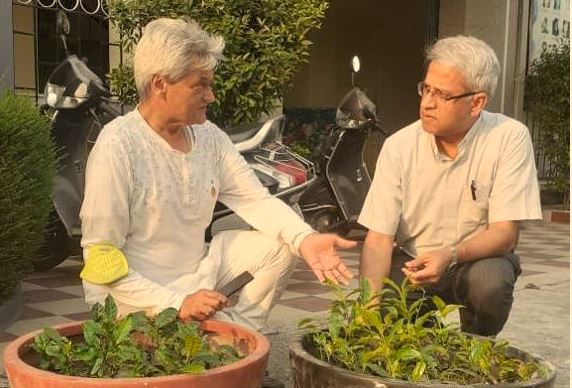INDIA: Salesian College Sonada receives tea saplings

Rimpocha Tea CEO Rajah Banerjee gifts tea saplings to Salesian College Sonada
(MissionNewswire) Legendary Darjeeling tea planter Rajah Banerjee, who developed his own tea variant plant christened Rimpocha, has gifted tea saplings to Salesian College Sonada Principal Father George Thadathil. Rimpocha is a registered trademark tea with a rare and special aroma. The new variant tea is indigenous to the foothills of Darjeeling, India.
”In the near future, we hope to jointly set up a tea academy in the Salesian College,” said Banerjee. His team will teach Salesian College gardeners how to nurture and also brew Rimpocha tea.
Fr. Thadathil confirmed that this collaboration will extend to a tea academy. He said, “It’s part of a memorandum of understanding with Rimpocha Tea being worked out.”
This is an additional collaboration between Rimpocha Tea and the Salesian College Sonada. In Dec. 2019, the Salesian College entered into a partnership with Rimpocha Tea to provide vocational training for adolescent girls in the area who are at risk of exploitation and human trafficking.
“Education and skills training are the only solution to prevent girls from falling prey to human traffickers who lure them with false promises of quick money and a better future,” said Fr. Thadathil.
The Salesian College Sonada was founded in 1938 and is located in the village of Gorabari. More than 95 percent of its student population comes from the hills of Darjeeling, a region known throughout the world for the quality of its tea leaves. In the Darjeeling District, there are currently 83 tea farms covering an area of about 19,000 hectares. These tea farms provide stable employment for more than 52,000 people.
The area faces challenges with people migrating from rural regions in search of a better life in more populous areas, which also puts people, especially girls, at risk of human trafficking. Compounding the problem is the low wages provided to those working in the tea industry. Many leave in search of better paying jobs.
Local organizations working to prevent trafficking estimate that more than 400 girls are trafficked every year from tea gardens, mostly from those gardens that have stopped functioning. Traffickers first look for their victims where hunger and poverty are higher rather than areas where businesses are stable, and there are more opportunities for higher education and health care.
Salesian programs across India are primarily focused on education. Salesian primary and secondary education helps youth prepare for later technical, vocational or university study. Other programs help to support poor youth and their families by meeting the basic needs of shelter, proper nutrition and medical care.
Access to professional training and workforce development services is highly valued by youth in India. The country, which is home to 1.34 billion people (18 percent of the world’s population), will have overtaken China as the world’s most populous country by 2024, according to the World Economic Forum. While India has the world’s largest youth population, it has yet to capitalize on this, leaving some 30 percent of this population without employment, education or training.
India has the world’s fourth-largest economy but more than 22 percent of the country lives in poverty. About 31 percent of the world’s multidimensionally poor children live in India, according to a report by the Oxford Poverty and Human Development Initiative. A multidimensionally poor child is one who lacks at least one-third of 10 indicators, grouped into three dimensions of poverty: health, education and standard of living.
###
Sources:
Photo courtesy of Don Bosco India
Don Bosco India – Legendary Makaibari Tea Planter gifts Tea Saplings to Salesian College
Salesian Missions – India
World Bank – India





